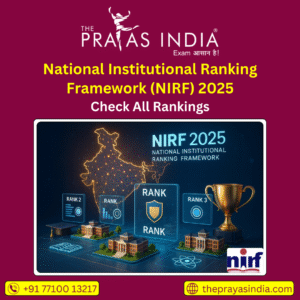The Speaker of the Lok Sabha: Powers, Responsibilities, and Constitutional Role
The role of the Speaker of the Lok Sabha is critical for UPSC GS Paper 2 (Polity & Constitution), Prelims (Parliament section), and Essay papers. Understanding the Speaker’s powers, responsibilities, and constitutional significance helps answer questions on parliamentary democracy, legislative functioning, and anti-defection laws. It also aids in analyzing governance and institutional checks-and-balances.
Introduction
The Speaker of the Lok Sabha is the presiding officer of the lower house of India’s Parliament. As the authority that maintains order and discipline during proceedings, the Speaker ensures impartiality, upholds parliamentary traditions, and protects democratic functioning. Recognized as the guardian of the house’s privileges and dignity, the Speaker acts as a neutral arbiter, enabling smooth legislative business and representing the Lok Sabha in official capacities.
Constitutional Provisions
Articles 93 to 97 of the Indian Constitution govern the office of the Speaker and Deputy Speaker of the Lok Sabha. The Speaker is elected by members of the Lok Sabha from among themselves, usually through a simple majority. The Speaker holds office during the Lok Sabha’s lifespan but continues in post until a successor is elected in the new house. Rules of Procedure and Conduct of Business in the Lok Sabha supplement constitutional provisions, outlining the Speaker’s powers to conduct business, maintain decorum, and adjudicate points of order.
Powers and Functions of the Speaker
Administrative Powers
The Speaker presides over Lok Sabha sessions, decides timing and agenda, enforces rules of conduct, and maintains discipline. When quorum is not met, the Speaker may adjourn or suspend proceedings. The Speaker can penalize unruly members and has the authority to disqualify MPs under the Tenth Schedule (Anti-Defection Law).
Legislative Powers
The Speaker certifies Money Bills under Article 110, deciding their classification — a decision conclusive and not subject to judicial review. The Speaker regulates debates, permits motions such as no-confidence or adjournment motions, and oversees the passage of bills.
Judicial and Quasi-Judicial Powers
As the authority on anti-defection matters, the Speaker adjudicates disqualification petitions filed against MPs under the Tenth Schedule. Further, the Speaker resolves points of order and interprets constitutional and procedural provisions during house proceedings.
Representative Role
The Speaker represents the Lok Sabha in communications with the President, Rajya Sabha, and executive. The Speaker coordinates with the Prime Minister and ministers to ensure legislative business is managed efficiently.
Speaker and Parliamentary Democracy
The Speaker’s neutrality and integrity are vital to parliamentary democracy. Renowned Speakers like G.V. Mavalankar, Somnath Chatterjee, and the current Speaker Om Birla exemplify impartiality and safeguarding democratic norms. In a polarized environment, the Speaker’s unbiased conduct ensures all voices are heard, enhancing trust in parliamentary processes.
Challenges and Controversies
Despite constitutional safeguards, Speakers have faced allegations of bias, especially in defection cases where delays in decision-making erode parliamentary credibility. Recent Supreme Court rulings have underscored the need for the Speaker’s impartiality and timely adjudication. Concerns continue about the dilution of debate quality and procedural fairness, emphasizing the need for institutional reforms.
Reforms and Recommendations
Committees like the Dinesh Goswami Committee and the National Commission to Review the Working of the Constitution (NCRWC) recommend strengthening Speaker impartiality. Proposed reforms include establishing independent tribunals for anti-defection disputes, fixed timelines for Speaker decisions, and enhancing parliamentary ethics training. Such measures aim to reinforce the Speaker’s role as a transparent and respected arbiter.
Conclusion
The Speaker of the Lok Sabha is rightly deemed the guardian of parliamentary democracy. Exercising authority above party lines in an impartial manner, the Speaker sustains parliamentary traditions and democratic debate. Their role is pivotal in preserving the Constitution’s spirit and ensuring the Lok Sabha’s effective functioning.
Frequently Asked Questions (FAQs)
Q1: Who elects the Speaker of the Lok Sabha?
The Speaker is elected by the members of the Lok Sabha from among themselves usually through a simple majority.
Q2: What is the term of the Speaker of the Lok Sabha?
The Speaker holds office during the life of the Lok Sabha, typically five years, but continues until a successor is elected.
Q3: Can the Speaker be removed from office?
Yes, the Speaker can be removed by a resolution passed by a majority of all Lok Sabha members after giving 14 days’ notice.
Q4: What are the main powers of the Speaker?
The Speaker maintains order and decorum, certifies Money Bills, adjudicates on disqualification under the Anti-Defection Law, and decides the admissibility of motions.
Q5: Is the Speaker supposed to be neutral?
Yes, the Speaker is expected to act impartially and uphold the rules and traditions of parliamentary democracy, transcending party affiliations.
Q6: What happens if the Speaker’s seat is vacant during removal proceedings?
During such proceedings, the Deputy Speaker or a member from the Panel of Chairpersons presides over the House.
Q7: How does the Speaker impact Democracy?
The Speaker protects rights of all members, ensures smooth functioning of the house, and safeguards democratic processes and privileges.








